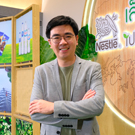Present-day environmental problems – including climate change, flooding, haze, etc. – have inevitably crept closer to all of us on this planet. Meanwhile, everyone’s daily behaviors affect the environment and are another major cause that aggravates the situation. The world is like a big home that we all live together, so it is everybody’s responsibility to help care for and protect it.
Nestlé recognizes and prioritizes environmental solutions. We would like to be a force that drives stewardship and protection of the nature, in the belief that every one of us can make an environmental impact for a better world for the future generation. Therefore, we held an event under the campaign “Every Little Act Matters” to spark ideas and inspirations, which suit each different role and lifestyle, for behavioral changes in consumers. Alex Rendell, Jarinporn “Toey” Joonkiat, owner of "3 Wheels Uncle" Facebook Page Prem Pruktayanon, and Nestlé representative Jiraphat Thansandose were invited to discuss environmental stewardship and share their earth-friendly ideas, under the topic “If the world was one big home, how would we take care of it?” and with Thanawat “DJ Nui” Prasitsomporn as moderator.
Mr. Victor Seah, Chairman and Chief Executive Officer of Nestlé Indochina, spoke of the commitment behind the event, “When COVID-19 first started in Thailand and things were so uncertain, I remember getting our team to work on scenario planning to have in place what we call plan B‘s. Looking back now we probably executed more plan B than the original plans. For matters of business we can afford to make a plan B. We cannot, however, say the same for our planet. The fact is we have no planet B. We cannot do a scenario planning exercise as this is the only planet that we have. And if we don’t take care of the planet, it will not take care of us. This event today reflects Nestlé‘s efforts to inspire Thai people to do their part in protecting a planet. Let’s all start by changing our mindset and behavior do little acts on a daily basis one step at a time. Even just little acts can create a better and more sustainable world for our children and for future generations. At Nestlé, we are doing our part by conducting business under the mission for sustainability. We are transitioning to recyclable packaging for all our products, significantly reducing the use of virgin plastic, and taking necessary actions to fulfill our net zero emission goal by 2050.”
For matters of business we can afford to make a plan B. We cannot, however, say the same for our planet. The fact is we have no planet B. We cannot do a scenario planning exercise as this is the only planet that we have. And if we don’t take care of the planet, it will not take care of us.
“If the world was one big home, how would we take care of it?”
Alex Rendell, eco-friendly actor, recounted, “Many trivial experiences built up to the tipping point for me to go green. I felt like together we could create small, beneficial changes. So, I looked into it and realized what a tremendous impact that would make to our planet. In this one big home, we may think our actions do not mean much. But every decision counts. Every use of resources – be it water, travel, or foods – can make an impact. So, I think when it comes to environmental problems, we need a collective mindset. It has to start with ourselves. If millions of others follow suit, the resulting positive impact will be tremendous. I myself started from making everything smaller. I choose products with sustainability marks and separate wet from dry waste to facilitate recycling. Last but not least, I want us to adopt a sustainable mindset and keep on going green, because ultimately our descendants will benefit from a better world.”
“Every little daily decision affects the world. Every use of resources – be it water, travel, or foods – can make an impact. So, everyone should help fix environmental problems. It has to start with ourselves, today.”
Jarinporn “Toey” Joonkiat, an actress who has become more eco-conscious, shared her experience, “Environmental issues are relevant to all of us and what we can tackle them starting with ourselves. Sometimes, we may just need to let go of minor personal convenience and think about all the possible benefits. Like, some people may not like to use paper straws, but they help mitigate environmental impact. The manufacturers have also been consumer-oriented in producing and developing them. As NESVITA’s representative, I am delighted to see its products come with paper straws. Us consumers can easily help save the world, for example, by choosing sustainable packaging and sorting trash starting with straightforward items like plastic bottles. Moreover, we can also reduce waste by considering the necessity of every purchase. Try choosing items that will last. This is an easy tip that anyone can pick up right away.”
“Us consumers can easily help reduce waste by choosing eco-friendly packaging like paper straws or sorting trash starting with plastic bottles for recycling.”
Prem Pruktayanon, owner of "3 Wheels Uncle" Facebook Page, spoke about waste problems, “On the process of waste management, if trash is not sorted first in a household, many types of trash will get mixed up in the waste collection process. This makes it harder to separate them and some may end up in a landfill or in nature. We at the upstream can choose how to dispose of waste: to throw it all together or properly separate and send it for recycling. Once you start, you will be motivated to do more. Therefore, I created the “Green2Get” application to help identify types of trash via scanning and link consumers up with recyclers. This tells us who can make use of the trash and facilitates waste separation among the public. That way, it will not have to end up in a landfill somewhere.”
“Separating waste in household is a start of the recycling process. This will decrease the amount of trash in landfills and in nature.”
The “3 Wheels Uncle" Facebook Page owner also passed on the inspiration to care for the planet, “This planet is our only home. We can get rid of trash in our houses, but the world cannot throw trash out into space. Waste does not go away. The same goes for resources: we can order stuff in the house if it runs out, but the world cannot order resources from other planets. Therefore, everyone should believe they can help out. The world is our home. Every little act matters.”
Jiraphat Thansandose, Head of Packaging Development Department at Nestlé Indochina, said “Nestlé as the world’s largest food and beverage producer is stepping up as a change leader. We would like to foster widespread innovation in this world that we all call home. Our mission is to alleviate climate impact through waste reduction and food supply chain management – from growing, cultivation, production, and transportation of goods, to use of environmentally friendly packaging. For example, we have shifted from plastic to paper straws, and from tin to recyclable aluminum cans. This is because we care about our packaging’s journey, from production to reuse. Nestlé’s does not only aim to do no harm to the planet, but also revitalizes the nature for a better world for generations to come.”
Jiraphat also closed with his earth-friendly ideas, “I aim to reduce the size of garbage bags at home. From visiting waste facilities, I learned that food leftover makes trash go bad. Therefore, I separate wet (food scraps) from dry waste. When washing dishes, I put food packaging in the sink too to rinse it before sorting and delivering it to proper places.”
“Nestlé adopts recyclable packaging to minimize environmental impact. We have shifted from plastic to paper straws, from tin to aluminum cans, and from plastic to paper packages; all to create a better world for our children.”
Thanawat “DJ Nui” Prasitsomporn added, “Some think environmental problems are not serious. However, global warming directly affects us. Our kids will inherit the planet. We should do something for them. Some are probably working on it. Others probably used to do it, but have since forgotten to. We all should go back to saving this planet. Since this is one big home, taking care of the world is everyone’s, not just someone’s, responsibility.”
“Since this is one big home, taking care of the world is everyone’s, not just someone’s, responsibility. Let’s all start with small actions to protect our home, together with Nestlé.”
Join Nestlé in caring for and protect our one big home by adopting minor behavioral changes in your daily life. We believe that every little act can spark public commitment to waste solutions, as well as revive the environment and drive momentous changes to pass a sustainable planet to future generations.
In addition to our effort in transitioning to eco-friendly packaging, Nestlé is also moving forward with our corporate social responsibility by tackling climate change for a sustainable future. Through sustainable agricultural practices, water resource conservation, and renewable electricity sourcing, we are implementing our sustainability roadmap to achieve net zero emissions by 2050.











